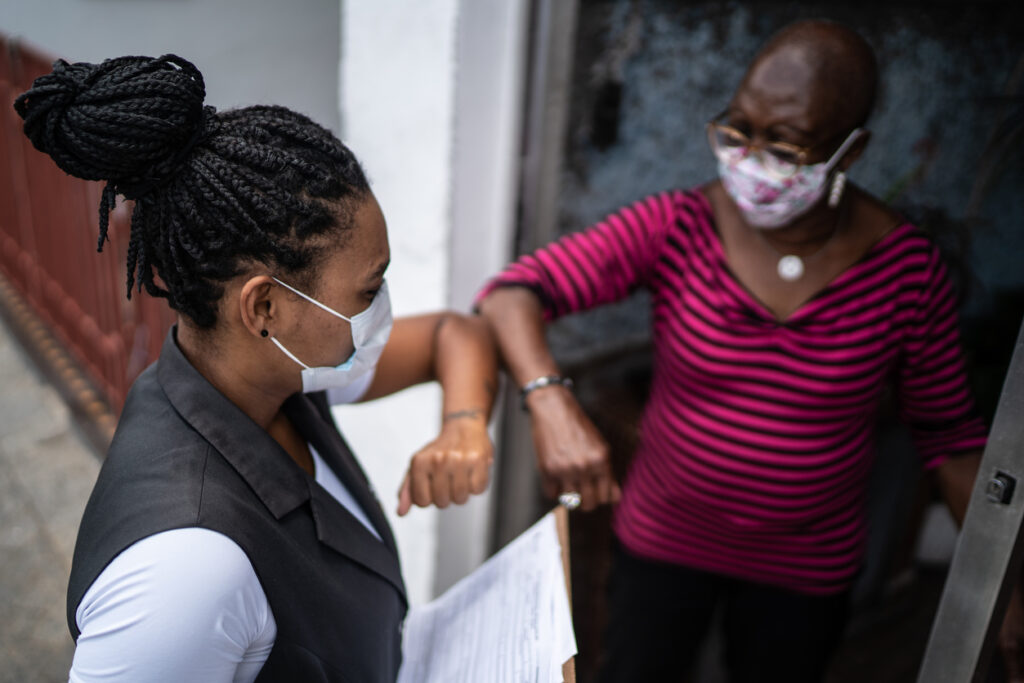Meeting People Where They Are: Combatting COVID-19 Misinformation Door-to-Door
- By: The Public Health Learning Network
- Date
It’s imperative for people to get vaccinated against COVID-19, which is why an outreach support training program wants to empower organizers. The Louisiana Public Health Institute (LPHI) is teaching community health professionals how to meet people where they are with a virtual training program. The training teaches local organizers how to inform people about COVID-19 vaccinations.
LPHI started with an initial recorded training where they gave tips on how to go door-to-door providing information on immunization. The training provides a framework for approaching conversations around the vaccine, coronavirus, and how to engage in a way that isn’t intimidating or judgemental. Morgan Moone is a senior program coordinator with LPHI and says it was challenging to find the right way to create a forum for productive and civil discourse with people who are fervently against the vaccine. But LPHI felt it was especially important to find common ground with those individuals.
A Listening Ear
“Even when folks end up still declining the vaccine, they’re just grateful that someone went to their door, offered information and a listening ear in a way that was non-judgmental and was purely informative and education focused,” Moone says.
People mostly just want to be heard and have their questions answered without being talked down to, according to Moone. LPHI started the training after noticing vaccinations were incredibly low in rural communities and places where people don’t have easy access to health clinics throughout Louisiana. The goal behind training local organizers to inform communities about the vaccine is to de-escalate the politically charged rhetoric behind COVID-19 vaccination. Local organizers pair up with nurses in order to better answer questions people have. Moone says that approach has helped community members feel more comfortable asking questions about the vaccine and how safe it is.

Combating Misinformation
There are many places online where people try and find information on COVID-19, the vaccine, and other treatments. Not all of those sources can be trusted, and it can be challenging to wade through so much information. False claims and misinformation have damaged vaccination efforts across the country. LPHI’s training is designed to help people find common ground and discuss ways to reduce the spread of COVID-19 as well as its variants. The video outlines an approach to conversations and provides the framework of a script for organizers so they’re not going in blind when they talk to people. LPHI is also listening to feedback and adjusting their tips as they hear from local organizers on what has worked best and what needs improvement. Moone is hopeful this iterative process will improve access to healthcare for the community overall.
“In a way, we are providing tools for the community to not only be anti-racist but also tools for building a different kind of structure and a different way we operate when we talk about health equity and access,” she says.
Meeting People Where They Are
The LPHI training is accessible for local organizers. It includes information on the science behind the vaccines, reasons for getting the vaccine, and how they help to reduce risk of severe illness and death. Because people are going door-to-door talking to people the training also includes ideas on how to get the conversation started. Moone says LPHI wants community-based organizations that are meeting people face-to-face to think about and apply safety measures as well.
When vaccinations first became available there were large vaccination sites, especially in urban areas. That’s a great way to increase vaccinations for people who have transportation and the means to take time off work, but it presents challenges for others.
“A lot of times in these communities transportation is an issue. Getting time off of work is an issue. Childcare is an issue,” Moone explains. “When we’re in New Orleans, Baton Rouge, even Shreveport, we don’t think about how much easier access is.”
It’s hard enough for people who work full time or more, to make it to a doctor’s appointment, let alone sit in line waiting to get a vaccine. There’s also the possibility of having a mild reaction to a COVID-19 vaccine, which could cause someone to have to take a day or two off work. Missing work may not be a realistic possibility for people working in the service industry or who don’t have paid sick time. LPHI recognizes this challenge, which is why they planned to meet people where they are–geographically, economically, and politically.
Some organizers have gone the extra step by deploying mobile vaccination units. That way, when they’re going door-to-door and someone decides they want the shot, there’s one less hurdle for them to get their first shot.
Although the training was specifically designed for the COVID-19 vaccination efforts, LPHI hopes by building this foundation of trust, people will feel more comfortable asking questions and seeking help from healthcare professionals. The one-on-one conversations nurses and organizers are having as a result of the training, could also help the healthcare industry communicate with their community.

 Subscribe To Our Communications
Subscribe To Our Communications